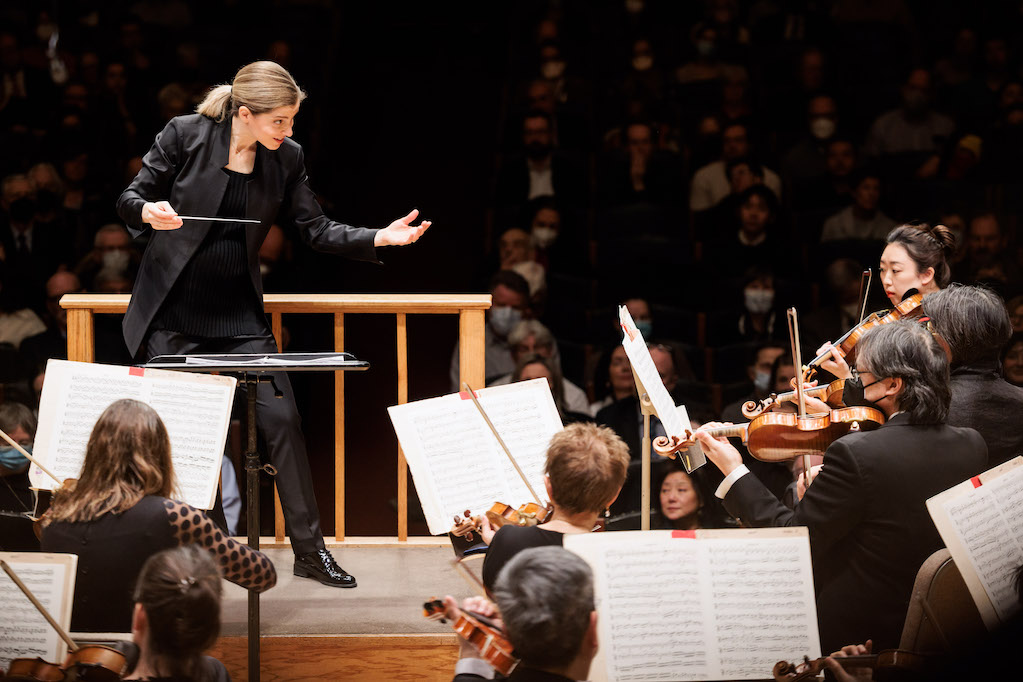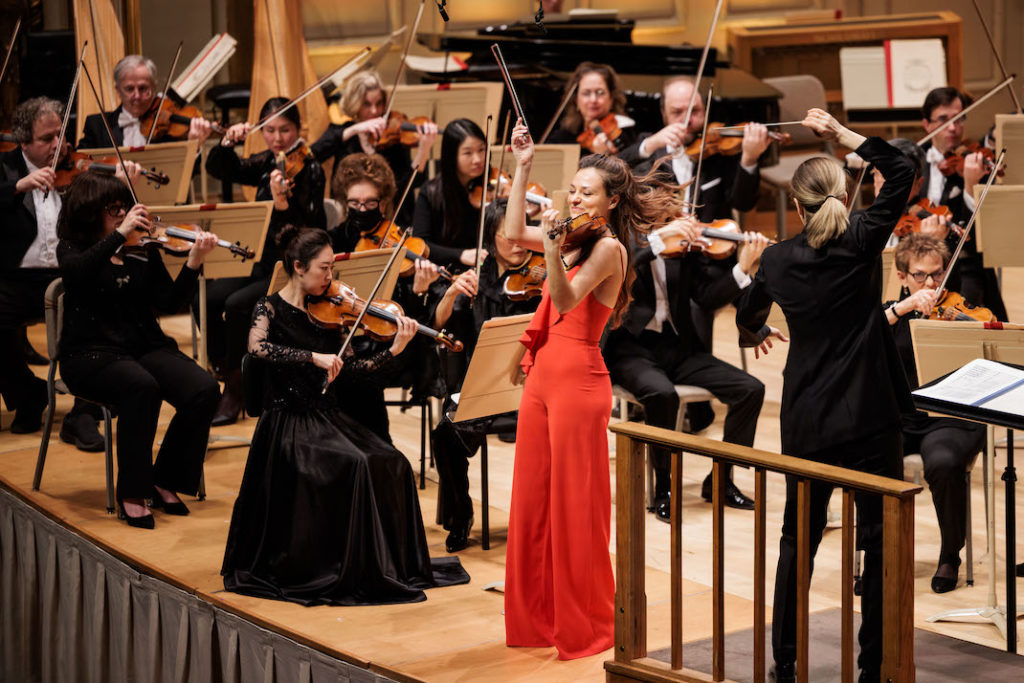Canellakis, Benedetti shine in Symphony Hall debuts and an evening of rarities

Karina Canellakis leading the Boston Symphony Orchestra on Thursday night at Symphony Hall. Photo: Aram Boghosian
For an orchestra that usually embraces canon over surprises, the Boston Symphony has had a bracing start to 2023. In the last two weeks, its concerts have offered an enticing mix of premieres as well as unfamiliar, ear-catching fare. The trend continued on Thursday night at Symphony Hall with the subscription series debut of Karina Canellakis. The former BSO Tanglewood fellow and guest conductor led an invigorating concert of rarely heard pieces by Antonín Dvořák, Karol Szymanowski and Witold Lutosławski.
It’s always welcome to hear one of Dvořák’s late tone poems, though they are infrequently offered by the BSO. The last time the ensemble assayed The Wood Dove was in 1905. The concluding installation in a set of four programmatic works based on macabre Czech folk tales, the score relates the story of a woman who poisons her husband, marries a young lover, and is consumed with guilt on hearing the cooing of the titular dove, which leads her to ultimately take her own life.
Given that backdrop, the piece proceeds in surprisingly direct fashion, structurally, with mournful outer thirds framing a tripping evocation of the rustic wedding. Thursday’s reading captured the spirit of the latter section particularly well: Its blend of rollicking dances and keening, bucolic woodwind lines emerged viscerally. So did the funereal opening sequence, which, in Canellakis’s hands, was pure-toned and tautly shaped, even its quiet gestures packing intensity.
The subtle gestures, too, sang impressively, like the mock-weeping violins in the first part and the eerie evocations of the eponymous bird in the third. This all emerged with an unaffected sense of naturalness and sensitivity to phrasing and textural detail. Canellakis delivered an uncannily fresh Dvořák.
Many of the same qualities were evident in the readings of Szymanowski’s Violin Concerto No. 2 and Lutosławski’s Concerto for Orchestra that followed.
The latter bristled with toughness and energy. Its first two movements were textbook demonstrations of the dramatic power of strongly contrasting musical ideas. Each was flawlessly balanced and articulate, and not just in brawny moments. The delicate closing section of the “Intrada” was simply magical.
Meanwhile, the sprawling, tripartite finale unfolded with a conspicuous blend of nobility, personality and thematic unity. Through it all – the Passacaglia’s bonkers woodwind figurations, the Toccata’s motoric episodes, the Chorale’s bewitching turns of harmony – Canellakis never lost sight of the musical line: It was ever audible, and not once consumed by the din.
The result was at once technically masterful and thoroughly exhilarating. Surely, one thought heading out into the rainy night, this is a piece that belongs at the center of the BSO’s repertoire, not on its periphery.
A similar case could be made for Szymanowski’s 1933 score, which the orchestra last presented in Boston thirty years ago. Less opulent in its orchestration and more restrained in tone than the composer’s better-known First Violin Concerto, the Second is arguably the stronger of the pair.
At least it seems that way when Nicola Benedetti is the soloist. Making her BSO debut this week, the Scottish violinist is proving to be one of today’s great virtuosi. On Thursday she projected all of the Szymanowski concerto’s notes – even in their most seemingly impossible combinations — with confidence.

Nicola Benedetti performing on Thursday Night with the Boston Symphony Orchestra at Symphony Hall. Photo: Aram Boghosian
More captivating than Benedetti’s technical wizardry, though, was her command of the music’s expressive essence. The score’s tonal shifts – like the astonishing journey from dusky to clarion in the opening melody – unfolded with surety. At the same time, the solo part’s melodic writing was consistently limber and dancing; even the most muscular statements were soulful. And the fearsome cadenza held no terrors on this night: It was dispatched with breathtaking panache.
Canellakis’s accompaniments were the picture of nuance and tasteful balance. While she let the BSO loose in a handful of orchestral moments, those never devolved into bedlam. Textural lucidity prevailed, the ensemble demonstrating respect for Szymanowski’s sumptuous orchestrations even as it reveled in them.
Perhaps the most remarkable statistic of the performance is this one: Not once, even in the Concerto’s soaring climax, was Benedetti’s instrument swamped. Thursday instead brought that rarest of partnerships between soloist, conductor and orchestra in which everything aligned.
The program repeats 1:30 p.m. Friday and 8 p.m. Saturday at Symphony Hall. bso.org
Posted in Performances




